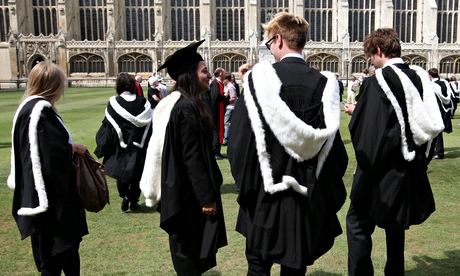
The issue of student fees has gained added urgency as the government admits its policy will be more expensive than planned. Photograph: Rex Features
Labour's manifesto for next year's election will include a pledge to scrap the coalition's £9,000-a-year tuition fees and may replace it with a maximum of £6,000, Douglas Alexander has confirmed.
Labour is still, however, to agree a long-term policy. Ed Miliband, the party leader, first made the pledge in his speech to the 2011 party conference, but the issue has gained added urgency after the government admitted the latest calculations suggest its policy will be more expensive than planned because of students' lower than forecast repayments.
Alexander, Labour's election co-ordinator, said the rate of default showed the coalition's policy was not working. "I expect it is a policy that we will address in our manifesto and I hope that we're able to offer a better solution to the students in this country and to the finances of this country than that we've seen from the Conservatives," he said.
In September 2011, Miliband said he would cut student fees to £6,000 by reversing a cut in the corporation tax banks pay. He also said graduates earning more than £65,000 would have to pay higher interest rates on their loans.
The Conservatives attacked Labour's plans, saying: "Ed Miliband is making an £800m unfunded spending promise. That will mean more borrowing and more taxes to pay for it, exactly what got us into a mess in the first place. It's the same old Labour with no plan to secure Britain's future."
Liam Byrne, the shadow higher education minister, has said the party was looking at a two-stage reform of student fees, starting with a cut and then a shift to a graduate tax.
Byrne recently told the Times Higher Education Supplement: "The policy we've set out is what we would do if we were in government today. Ed Miliband also said in his leadership campaign our long-term goal must be to move towards a graduate tax.
"What we'll have to do in our manifesto is take our starting point of £6k fees, explain how we see the situation for 2015 to 2020, and how we'll see a long-term shift to a graduate tax."
John Denham, who was universities secretary in the last Labour government, has also been working on a plan to cut the cost of fees and to replace non-repayable means-tested maintenance grants entirely with loans.
Denham has called for a revival of employer co-sponsored degrees, and more two-year intensive degrees to replace three-year courses.
He had proposed a flat-rate student entitlement of nearly £15,000, bringing the average total fee for a three-year degree down to below £10,000, the same as when Labour left office. A two-year degree would cost £5,000 and the employer-backed degree would cost the student nothing.
The discussion of student fees came as the latest YouGov daily tracker showed Labour springing back to a seven-point lead. Some, however to regard poll as rogue, given that most other polls since the budget have shown the party's lead narrowing. An Opinium/Observer poll showed a two-point fall in Labour's lead, leaving it just one point ahead of the Tories.
Alexander insisted the cost of living issue was not "running out of steam".
"This is a Conservative government that's running out of time. We know that at the time of the election, for the first time in decades, we're going to have a government that has delivered lower living standards for millions of British families, £1,600 worse off at the end of the parliament than at the beginning of the parliament".
Following a recent spate of stories claiming there is in-fighting in the Labour election team, Alexander denied he had sacked the party's community organiser, Arnie Graff. Aides to the Labour MP Michael Dugher denied he had threatened to resign over Alexander's growing influence.
Alexander also rejected claims he was preparing a safety first manifesto. "I think one of the insights of this generation of Labour leaders is that it's a totally false choice to be credible or radical," he said. "If you're not credible then people won't trust you with the governance of the country. If you're not radical people will just say 'oh you're all the same'."
No comments:
Post a Comment
thank you for your precious time and feedback.